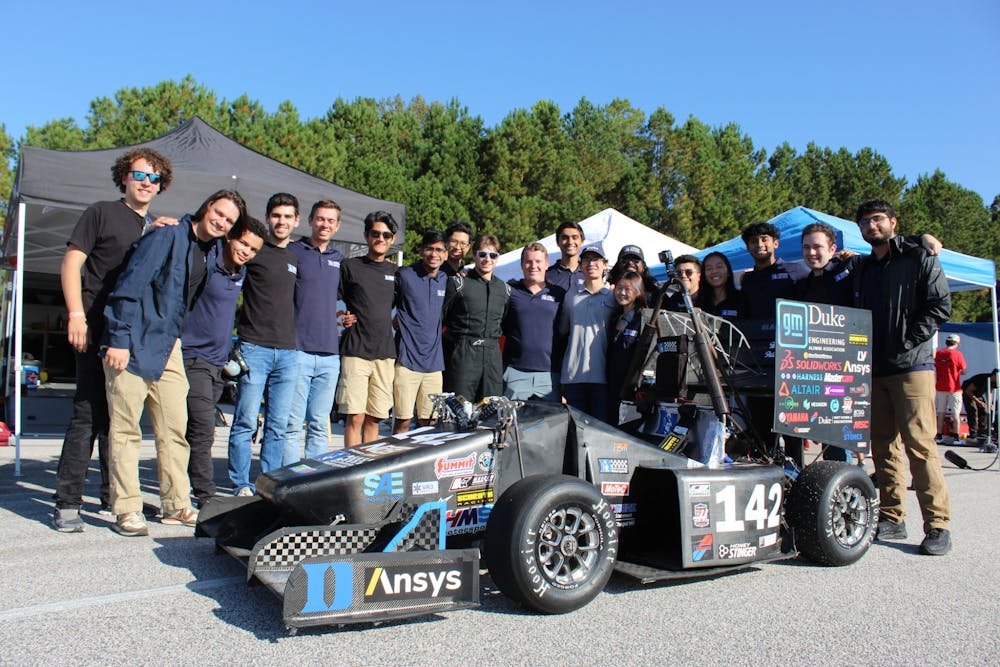Each year, Duke AERO and Duke Motorsports spend hours each week developing innovative subsystem designs and gaining hands-on engineering experience to test their rocketry and car design skills against collegiate teams around the world that summer.
Both these clubs are driving innovation in their respective fields through unique designs like deployable air brakes, an engine dynamometer and enhancing engine power.
Senior Connor Gregg, president of Duke Motorsports, describes the club as a way for students to apply what they've learned in the classroom to a project, adding that the team is open to all Duke students, including those who are not in Pratt.
Duke AERO’s president and lead engineer, senior Josh Kramer, described the club as “an outlet for students who are interested in rocketry.” A relatively new club, Duke AERO has rapidly grown from four members in 2018 to approximately 40 active members today, Kramer says. Members work to design a 10- to 11-foot rocket to compete in the annual Spaceport America Cup, which sees over 150 teams from around the world launch their rockets in the New Mexico desert.
Rockets must reach a specified height of 10,000 or 30,000 feet and recover successfully. Last year, Duke’s team displayed a novel air brake system, purposefully overspeeding the motor and adding drag blades that slow the rocket down, as well as an in-house manufactured flight computer that allowed them to monitor flight data and control the air brake’s deployment.
Kramer credits most of the team’s technical background knowledge to engineering courses but notes that the ability to apply this knowledge to rocketry projects can only come from hands-on experience.
Unlike Duke AERO, Duke Motorsports has been around for 30 years. The club started as a small group of students wanting to compete in local race car driving competitions. By the early 2000s, club members started designing and manufacturing their own cars and competing in the annual Formula SAE competition. This competition sees around 120 teams from across the U.S. and Europe race and compete against each other in various design, presentation and manufacturing categories.
In contrast to competitors, Duke Motorsports takes a unique approach to the car's powertrain. The club opts for greener, lower emission 85% ethanol fuel alongside a larger but heavier engine and turbocharger. These modifications generate more power for the car but also require adjusting car components and design to accommodate this heavier configuration.
Duke Motorsports created its engine dynamometer by February, allowing the team to test the engine outside the car before it goes out on the track.
Despite the novelties of both of these clubs, they are still rooted in their passion for their work and sharing knowledge with incoming members. Most members come into these clubs with no experience in rocket or car design and, contrary to many other colleges, members do not undergo any selection process.
“Sometimes the people who end up performing the best after they’ve been there for a semester or year are the people who you would’ve never expected at the beginning,” Gregg said.
Both clubs work to pass down technical knowledge to new members and host workshops where they can develop their skills. While they aren't the main focus of the team, Gregg noted that the team's outreach events throughout the year can help promote their work and engineering as a whole, both for Pratt and the rest of the Durham community.
Kramer and Gregg credit Duke AERO and Duke Motorsports respectively for transforming their academic careers at Duke and building community around a shared passion. Kramer said that building rockets gave him a “lot more confidence in [his] abilities as an engineer.”
“The engineering and the skills are wonderful, and my career at Duke would be very different without it,” Gregg said.
Get The Chronicle straight to your inbox
Signup for our weekly newsletter. Cancel at any time.
Ana Despa is a Pratt sophomore and an associate news editor for the news department.

